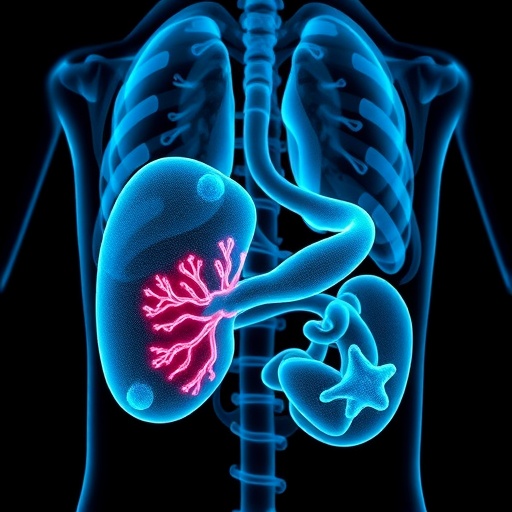In a groundbreaking study executed at the Third Affiliated Hospital of Kunming Medical University, researchers have unveiled critical insights into prognostic indicators for patients afflicted with advanced hepatocellular carcinoma (HCC) undergoing combined therapeutic regimens. The investigation particularly focuses on the secretion status of alpha-fetoprotein (AFP) and prothrombin induced by vitamin K absence-II (PIVKA-II), evaluating their potential as predictors of treatment outcome when transcatheter arterial chemoembolization (TACE) is paired with systemic therapies, specifically immune checkpoint inhibitors (ICIs) and tyrosine kinase inhibitors (TKIs).
Advanced HCC remains a formidable challenge in oncology, often diagnosed at stages where curative options are limited. TACE has been established as a local-regional treatment modality, selectively targeting tumor blood supply to induce ischemic necrosis. However, the heterogeneity in patient response necessitates biomarkers that can effectively prognosticate therapeutic efficacy. This study bridges this gap by establishing a correlation between changes in serum AFP and PIVKA-II levels and patient survival metrics following combined treatment approaches.
The retrospective cohort, spanning from May 2021 to March 2024, included 215 advanced HCC patients treated with the integration of TACE, ICIs, and TKIs. Patients were stratified into four distinct groups based on ascendant or descendant trends in AFP and PIVKA-II levels post-treatment: both markers decreasing (status 1), AFP decreasing and PIVKA-II increasing (status 2), AFP increasing and PIVKA-II decreasing (status 3), and both markers increasing (status 4). This categorization was pivotal in delineating survival probabilities and progression trajectories.
Statistical analyses utilizing Kaplan-Meier survival curves revealed stark disparities in both overall survival (OS) and progression-free survival (PFS) among the four AFP-PIVKA-II status groups. Notably, individuals demonstrating simultaneous elevations in AFP and PIVKA-II post-therapy (status 4) exhibited the most dismal prognosis, characterized by significantly reduced OS and PFS benchmarks. This particular group accentuates the aggressiveness of the disease and the potential resistance mechanisms against the combined therapeutic assault.
Further dissection using univariate and multivariate Cox regression models pinpointed the AFP-PIVKA secretion status as a robust independent prognostic factor for both OS and PFS. Elevated AFP or PIVKA-II alone were each linked to heightened risks of disease progression and mortality, but the concomitant elevation of both markers compounded this risk substantially. These findings underscore the multifaceted nature of tumor biology in HCC, where biomarker interplay is indicative of underlying tumor dynamics and therapeutic resistance.
The study’s implications are profound in the clinical management of advanced HCC. Monitoring AFP and PIVKA-II secretion trends can serve as a pragmatic, non-invasive tool to dynamically assess patient response during and after TACE combined with systemic therapy. This stratification allows oncologists to identify patients at higher risk of progression earlier in the treatment continuum, potentially guiding timely therapeutic adjustments and personalized medicine approaches.
Technical nuances of the methodology further strengthen the findings. The integration of ICIs, which unleash anti-tumor immune responses by inhibiting immune checkpoints, with TKIs that target multiple oncogenic signaling pathways, represents a cutting-edge paradigm. Evaluating how these agents interact with locoregional interventions like TACE, and how biomarker levels reflect this interplay, necessitates rigorous clinical investigation as presented.
The observed correlation between biomarker secretion and survival outcomes highlights a crucial link between biochemical tumor markers and microscopic tumor behavior. AFP is known to be produced by malignant hepatocytes, while PIVKA-II levels correlate with aberrant coagulation processes triggered by tumor growth and angiogenesis. Combined assessment of these markers might reflect both tumor burden and biological aggressiveness more comprehensively than either marker alone.
Another salient aspect is the study’s inclusion criteria, focusing exclusively on advanced-stage HCC patients. This focus makes the findings particularly relevant for a patient population often deemed refractory to conventional monotherapies. The demonstrated utility of AFP-PIVKA status in this setting may spur developments in tailoring treatment regimens or integrating novel agents alongside TACE.
The retrospective nature of the study, while introducing potential limitations, offers valuable real-world data reflecting clinical practice. Such evidence solidifies the concept that dynamic biomarker monitoring can transcend theoretical prognostication and move into routine clinical decision-making. Prospective studies with larger cohorts will be essential to validate and refine these observations further.
The authors also emphasize that fluctuations in AFP and PIVKA-II are not merely correlative but may possess predictive significance, guiding early therapeutic response evaluations. Such predictive capabilities can drastically enhance patient counseling, optimize resource allocation, and accelerate the transition towards precision oncology.
Moreover, the mechanistic underpinnings of AFP and PIVKA-II elevation in resistant cases warrant continuing exploration to elucidate pathways that could become secondary therapeutic targets. Understanding whether these markers actively participate in resistance or simply indicate tumor progression may open the door for innovative combination therapies.
This study enriches the oncological discourse by integrating biomarker research with multimodal therapeutic regimens that embody contemporary advances in HCC treatment. The refined AFP-PIVKA-II secretion status classification augments existing prognostic models, furnishing clinicians with actionable insights into treatment response and disease trajectory.
In conclusion, the research delineates AFP-PIVKA status as a pivotal prognostic tool, independent of other known clinical variables, in predicting outcomes for advanced HCC patients managed with TACE combined with immune checkpoint and tyrosine kinase inhibition. This work signals a paradigm shift towards routine biomarker-guided therapeutic strategies poised to enhance survival outcomes for this challenging patient cohort.
By establishing robust evidence linking AFP and PIVKA-II changes to survival, this study paves the way for integrating serum biomarker trends into clinical algorithms, advancing both survival prognosis and personalized intervention in advanced hepatocellular carcinoma care.
Subject of Research: Prognostic significance of AFP and PIVKA-II secretion status in advanced hepatocellular carcinoma patients treated with TACE and systemic therapies.
Article Title: Effect of AFP and PIVKA-II secretion status on prognosis of advanced hepatocellular carcinoma patients receiving TACE combined with systemic therapy
Article References:
Bai, J., Zhou, J., Zhao, X. et al. Effect of AFP and PIVKA-II secretion status on prognosis of advanced hepatocellular carcinoma patients receiving TACE combined with systemic therapy. BMC Cancer 25, 1701 (2025). https://doi.org/10.1186/s12885-025-15040-9
Image Credits: Scienmag.com
DOI: 10.1186/s12885-025-15040-9
Keywords: Hepatocellular carcinoma, AFP, PIVKA-II, transcatheter arterial chemoembolization, immune checkpoint inhibitors, tyrosine kinase inhibitors, prognostic biomarkers, overall survival, progression-free survival, systemic therapy




